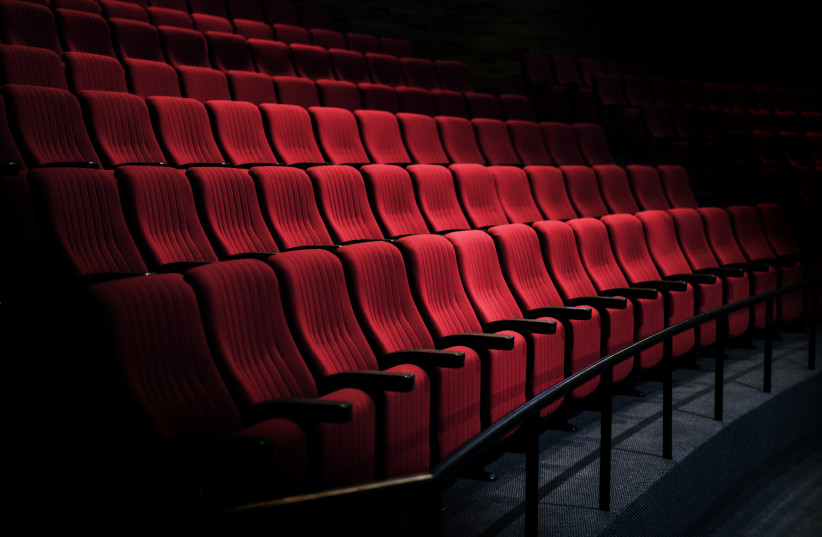Maryam Touzani, The Blue Caftan's director, debuts in Israeli theaters this Thursday. Nabil Ayouch, the film’s producer, was excited to be in Israel in 2022 as a guest at the 38th Haifa International Film Festival.
They were part of a group of Moroccan filmmakers attending the festival. They said they had been to Israel several times, presenting their previous movies and serving on film festival juries.
Although there has been a normalization agreement between Israel and Morocco since 2020, they both felt that the two countries have been connected artistically for more than two decades.
“We didn’t wait for political agreements to come here,” said Ayouch, who has directed movies such as Casablanca Beats (2021) about the rap scene in Morocco, which was nominated for the Palme d’Or at Cannes and which Touzani wrote with him. “My films have been shown in Israel. Maryam’s films have been shown here.”
The Blue Caftan is a beautifully photographed film that tells the story of a complex triangle. Saleh Bakri, best known in Israel for his Ophir Award-winning performance in The Band’s Visit by Eran Kolirin, plays Halim, who is a master tailor and runs a shop in a medina with his wife, Mina (Lubna Azabal, who starred in the Oscar-nominated film Incendies, as well as Guy Nattiv and Erez Tadmor’s Strangers.)
She runs the place and keeps it organized, but he has excellent sewing and embroidery skills. He creates each gorgeous garment through hours and hours of meticulous work. Yet the two are under pressure. People don’t care about handcrafted clothing as much as they used to, and they are reluctant to pay for quality work, which is tough on the couple.
What is far tougher is that Mina is dying of cancer. She musters all her strength to bargain with customers but is fading. When a new apprentice, Youssef (Ayoub Missioui,) comes to learn the trade and help Halim, Mina is forced to confront a truth she has avoided for years: Halim is gay, and he and Youssef are falling deeply in love.
She and Halim also love each other very much, and as her life ebbs away, she struggles to let go and give Hailm her blessing for his new relationship. The film examines the contradictions between the couple’s devotion to a tradition that values a tailor’s skills and handcrafted work but also condemns love between two men.
Unspoken passion: Royal blue caftan

A CHANCE encounter led Touzani to develop the idea for the screenplay.
“I met an older man, and he talked to me about his life,” said Touzani, who had worked as a journalist before becoming a filmmaker. “I was moved by him and by everything I sensed he wasn’t saying.”
The conversation made her think about “other couples I had seen when I was growing up,” she said. “Men who worked together, who presented themselves publicly as friends, but when I thought about it, I sensed something more.”
She began to think about a story that would unfold in a small tailor shop with the colorful caftans representing unspoken passion. These caftans, often made of silk and other delicate fabrics and decorated with intricate embroidery, are essential in women’s lives in Morocco and are worn on festive occasions.
“My mother had a black caftan that I always loved. I tried it all the time, and she gave it to me one day,” she recalled. “It was a very emotional moment, that moment of inheriting something. I thought about how it was made, how hard it was to make.”
She said her thoughts about this process and her conversation with that older man led her to craft this story, which takes place between all three of the characters during the time that Halim creates the royal blue caftan referenced in the title.
“The secret of this male’s (tailor’s) homosexuality embodied the essence of everything I had been thinking of,” she said. “He wants to keep the tradition alive, but because of the tradition, he cannot be who he is ... As he sews the caftan, he is stitching his wounds.”
Traditionally, these caftans are made by men but worn by women. “I knew this man would have a wife, and I wanted to explore what she would be feeling, too,” she said. “We see that there is more than one kind of love. Between Mina and Halim, there is happiness and harmony.”
Touzani saw and loved one of her future husband’s movies, Ali Zaoua: Prince of the Streets, about homeless children in Morocco, on television in Europe years before they met. Once they got to know each other, he encouraged her to become a filmmaker, and they have been collaborating ever since.
“I couldn’t dream of anybody else to give me feedback on my films... to be there to share my life,” she stated.
